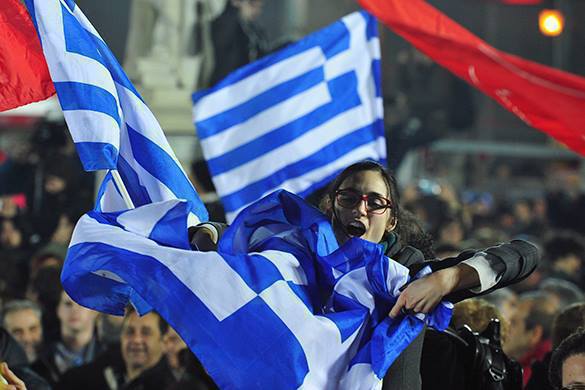Greece after EU: Which disaster in store for people?
Pravda.Ru conducted an interview with Andreas Andrianopoulos, a former minister in several Greek governments and nine-term member of the Greek parliament, currently Director of the Institute of Diplomacy and Global Affairs of the American College of Greece.

"The latest events in Greece are moving so rapidly, it's hard to follow them. What does Greece strive for at the negotiations with the Eurogroup? Why can't they reach the agreement?"
"The appropriate person to answer that is the Greek government, the Greek PM. But, officially they couldn't reach the agreement, because they wouldn't agree on the terms which, the Greek government thought were preposterous. However, the most preposterous of the measures proposed were the ones suggested by the Greek government. That is huge taxation, and some immense cuts in various benefits. The government on the other hand had insisted beforehand, that they would either alleviate any kind of agreement with the lenders, or find an agreement which doesn't impose any burdens on Greek people. But that logically was entirely preposterous, that couldn't happen. Nobody will lend you money without strings attached. So, what happens now, recently, is that the government couldn't reach the agreement which would be acceptable to the Greek public, to the Greek voters, and to the members of their party. So, they decided to go to the people, to go to the referendum and put the burden on the back of the people. And this is basically the issue. There is no clearcut dilemma. The question of the referendum is very very blur."
"And how is it stated?"
"It says, do you agree with the lender's proposal which is just about half a page, or not. Nobody knows what is the full text of the lender's proposal. The Greek Bar Association asked for the full text, and there was trouble. So, the people go to vote on something they don't know what the content is of what they are voting on. The other thing is that the lenders, after the referendum was announced, withdrew their proposal. So, now we go to vote on a proposal that doesn't exist. People are asked, "do you agree with the proposal?" And the proposal is no longer there. So, what are they going to vote on?"
"And the third issue is much more serious. Is that we don't know what is going to happen after, either if we vote "yes", or if we vote "no". If we vote "yes", obviously the government has to go, as it made the campaign in favour of "no". So, if people vote "yes", how can the government survive? The PM the day before said in public that if he loses the vote, if people vote "yes", he will bring the agreement to parliament. But I mentioned before to you that the agreement is no longer there. So, what agreement is he going to bring to the parliament? And then, if he brings the agreement to parliament, he does not resign . The parliament is controlled by his party. So, will the parliament vote in favour of the agreement? And vote against their political views? It's another big question."
"The other thing is even if we vote "yes", even if the PM decides to bring to the parliament and force the parliament to vote in favour of the agreement, now the lenders don't believe in the agreement any longer. Are they going to believe that they should have another agreement, another bailout agreement? I have to remind you that the bailout agreement we had with the lenders, has finished the day before yesterday. So, now if we have an agreement, it has to be decided and comprised from the beginning. Which means it has to be decided on a negotiating table and then it has to go to all 18 parliaments to vote in favour of it. Will that happen? We don't know. So if we vote "yes", we don't know what we are voting on. The only thing we vote for, is that we vote against "no", which means we go out of the EU. And again, if we vote "no", the government says, this is not against the EU, this is not moving out of the Euro. But this will inevitably happen.
What will lenders do after the results of the Greek vote?
"The lenders, the German parliament for example yesterday, Mrs Merkel, most of the leaders of Europe said they can't do anything, before they see the results of the referendum. So if they get a "no" result, which obviously says "we don't agree to what you are thinking and you are proposing", they'll say to us - go your own way. Already the bailout agreement has finished, there is nothing tying up Greece with Europe any longer, the banks obviously will not reopen, because the EU Central Bank won't support their financing. So, if we vote "no", the inevitable next step will be to go to drachma, because we have to print money to pay our obligations, at least inside the country. Then if you print money without the approval of the EU, automatically you violate the EU rules. So, you move out of the EU on your own initiative, not because they throw you out. You go out yourself. As you realize, we are at dead end situation. It's like in the ancient Greek mythology Odesseus between Scylla and Charybdis. You vote "yes", you don't know what the result is going to be, you vote "no", you know the disaster is coming. So most reasonable Greeks would vote "yes". But neither means that we are at a safe port."
"And will the referendum take place on the 5th of July? Maybe its just a bargaining?"
"It would have been a bargaining, had it been cancelled, but the referendum will go on. Among the confusing things is that the PM yesterday morning, very early morning, sent the letter to the lenders acknowledging that he agrees with their proposals, with some minor additions. After he did this, the stock markets went up. And at about midday, he made a presentation on TV insisting on the "no" vote and accusing the lenders of being blackmailers. Can you figure out anything out of that? I have a question mark.
"The day before yesterday at midnight the bailout agreement that Greece had, which was safe card in its economy, had expired, finished. And the banks were closed, and Greece was out on a limb. Stock markets were down. Yesterday morning, early the morning, the PM sent this letter, stock markets went up. People who new that he was going to send this letter, they have made a lot of money. And that for me is a question mark."
"Why did Mr Varoufakis, the Minister of Finance, threatened to file a lawsuit against the EU to the European Court?"
"Mr Varoufakis has said many things that don't stand to reason. I don't want to sound cynic, but Mr Varoufakis has said, that there is not a chance that there is going to be bank controls, capital controls, and of course the banks are closed, he had said the banks will never close, the banks closed. He had said we don't need money from the EU, now we are asking for money, because we cannot pay our dues. He had said many things which do not have consequence. Now when he talks about bringing the EU to the court, it is on the premise that the EU would decide to throw Greece out of the community. But the EU will not throw Greece out of the community, Greece will have to by necessity walk out of the EU itself. Why? Because we won't have the funds to fulfill our economic obligations.
Is there any alternative for Greece?
"It's simple. Our income, the money we get from taxation is much less than our expenses. Up to now we were covering the difference with borrowing. After we couldn't borrow any longer, as the interest rates have surged very very high, we formulated this bailout agreement to the lenders. And they were supporting it. Now the bailout agreement is finished and Greece is out on a limb. Who is going to fulfill our obligations and cover the difference in the expenses? Nobody would lend us money. The international markets do not agree even for one second to lend us money, because they need tremendously high interest rates. So what else? What is the other alternative? To print our own money, or to print alternative currency, while still in the EU and pay some obligations, especially salaries and pensions with this money. But if you do that without the agreement of the EU, or Eurogroup, you violate standing rules of the EU, and there is a penalty. The penalty is exclusion from the community, so if it's not that the Europeans would tell us walk out, is that we'll be forced to walk out by ourselves in order to fulfill our obligations. So, Mr varoufakis is off the mark one more time."
"Does the Greek government have any plan, in case the country will have to leave the Eurozone?"
"I doubt it. No, I say no, because the governent says we don't want to move out of the EU. Unless they have a secret agenda and telling Greece to walk out of the Euro, print drachma and follow a different course of events. That may be the plan B. Some people say so, but I still don't believe it. But maybe it is an alternative plan, which of course is a disaster for the country and for the Greek people, because they won't be able to survive. Imagine, if we walk out from the Euro, and return to a different currency, it will be almost impossible to import anything, because we won't have hard currency. Maybe it'll take about 5 or 6 years to build up our industries, to build up our exports and being able to have a currency to start importing staff. What do you do in the mean time? How do you survive with not being able to pay for energy? Let's take the example of gas, which we import from Russia. We have to pay for gas. How are we going to pay? With drachmas? Who is going to get drachmas? How do you pay for food stuff? We import about 80 % of our food stuff. How do you pay for medicine? You need to import medicine for people with diabetes, with cancer. All these medicines are not Greek made. They are made abroad and have to be imported. So, it's going to be a humanitarin disaster, unfortunately."
"And is the country really so poor? Isn't it available to develop on its own?"
"We don't have natural resources, unfortunately. We are not Russia, having oil, gas, metal, nickel. We have nothing like that. The only thing that Greece has is tourism and shipping. But shipping is all over the world. And if you decide, like the government has said, to impose taxation on shipowners and shipping agencies, they'll move their headquarters to flags of convenience, out of the country. And of course for tourism to developing and being attractive, a stable environment is needed. And what kind of stable environment do we have? The banks are closing, tourists come and can not get from the ATM money to spend for their daily needs. And what else can you do? And of course the money you get from tourism, is not enough to sustain a huge public sector we have, which is very difficult to survive under the circumstances of austerity, and without borrowed money flowing in to cover expenses, salaries and pensions."
"Which country can follow Greece?"
"I don't know, it is difficult to say. I don't think that Greece's exit or collapse would influence the rest of the EU, as many people think. For a start, the Europeans have already forethought about this development. It is not like in 2008 and 2012, when the EU banks were loaded with Greek bonds. So, if Greek had collapse, had default, then the Europeans would have to cover up the deficit in their banks. Now they had got rid of Greek bonds. Either they are in the Central European Bank, or they have moved to other banks, especially in Cyprus. That is why Cyprus collapsed? When there was haircut of Greek debt, Cypriot banks collapsed, they were loaded with Greek bonds. The rest of Europe doesn't have this problem. There is going to be a turmoil in the markets, but not to such extent.
"I'll give you an example, when the bailout program for Greece ran out yesterday night, there was a 3 or 4 % collapse in stock markets, and then yesterday morning they went up again. So that was it. There are currencies interconnected, there may be some difficulties in trying to see what they are going to do with currencies still resting in Greek banks and how they are disentangled the one from the other. But these are basically bureaucratic and administrative issues. It is not a big issue. The only thing is political, the idea that the Eurozone is not as solid as people thought. But for many years people thought that Greece is a weak link in the Eurozone. So, they may have anticipated the possibility of Greece's exit. So now they have foresawn what may happen. And I don't think that a precursor is so high. For us it is a problem, because we have a build-up relations with China, for example. But commercial relations with China are based on the premise that Greece is a member of the EU. So the Chinese would need Greek investment outlets like ports, like the railway system to have Greece as a hub and forward their goods to the European capitals."
"If Greece is out, what's going to be the end result?"
"We have good relations with Russia, for example. But we are much more useful as a good friend to Russia as we are a member of the EU. If we are not members of the EU, we'll be like Belarus, or another country that may be friend with Russia.
"So, we are cutting down our options, if we move out of Euro. It will be not only non-beneficial to us, but also will be a negative result for our friends as well. So, this is why I hope that we don't move out of the EU. And I believe that we should vote "yes", not because this is a better alternative, I detest it, because I detest taxation, I hate taxation. But it's much better than voting "no" and walk out of the EU by ourselves, with our own initiative."
"What did Putin promise to Tsipras in St.Petersbourg?"
"Mr Tsipras came to St.Petersburg and made a number of statements. But I don't know what he promised. I mean, I don't think he had a clear plan for the future. At least he doesn't appear to have a plan for the future. This is why he is undermining his credibility, not only to his opponents and his rivals, but also to his friends. And this is a big problem."
Interview conducted by Galina Tychinskaya
Pravda.Ru
We would like to thank Moscow Marriott Hotel Novy Arbat for providing a location for the interview
Subscribe to Pravda.Ru Telegram channel, Facebook, RSS!




